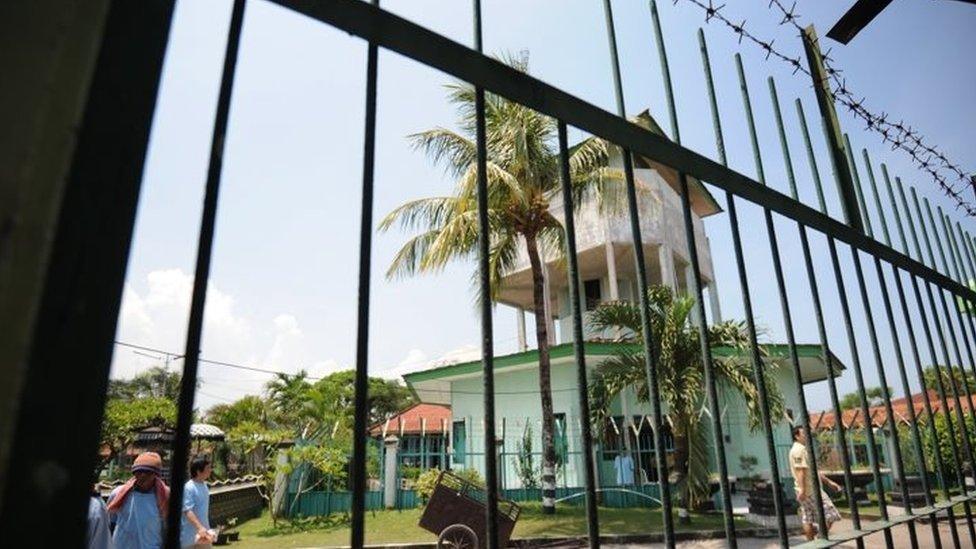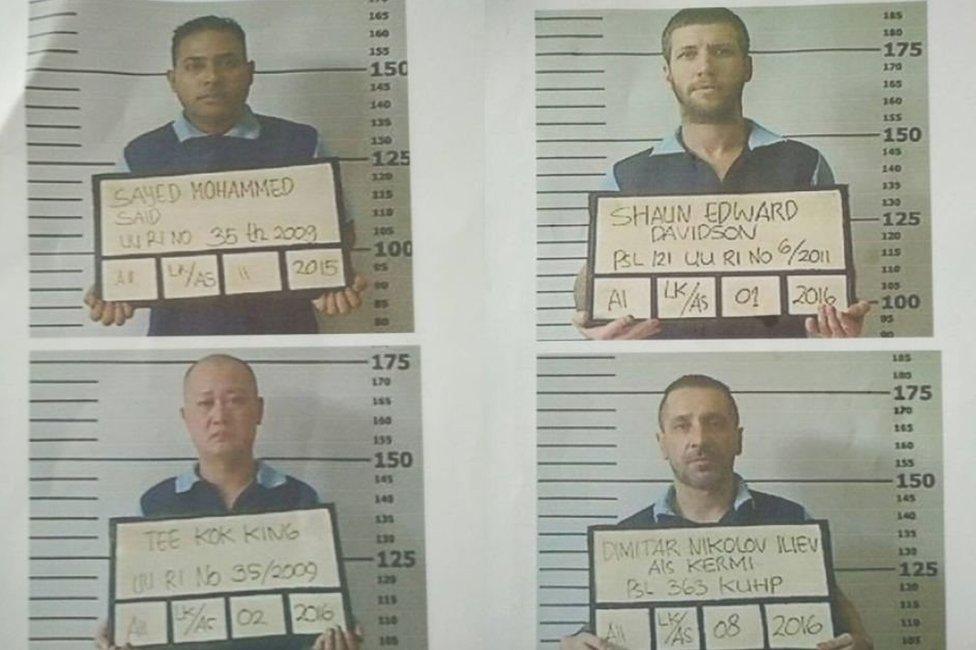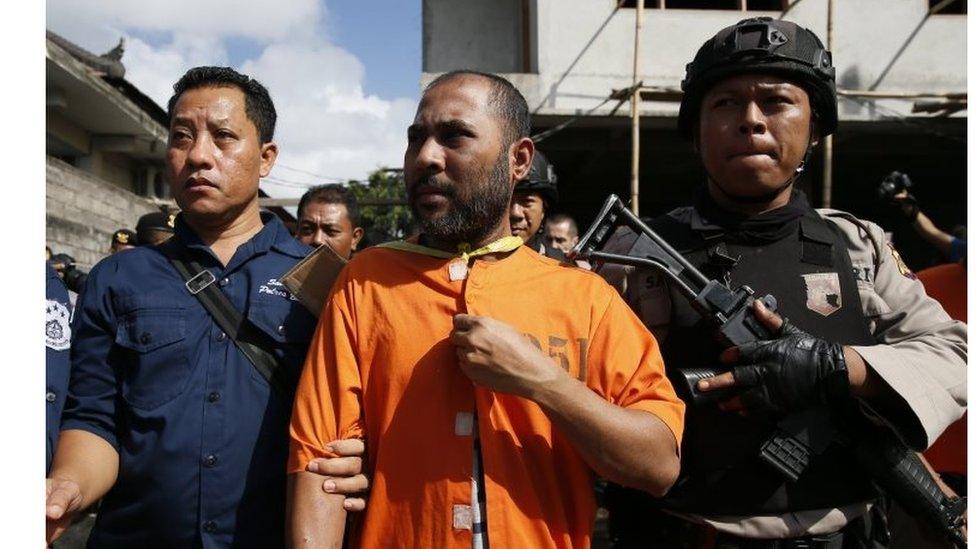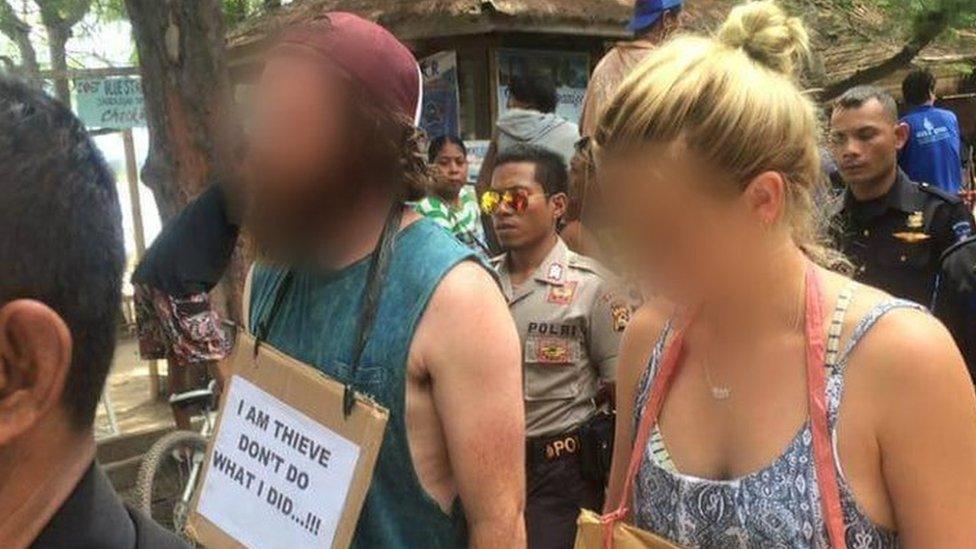Shaun Davidson: Tracking Australia's most notorious jailbreaker
- Published

Davidson broke out of Bali's notorious Kerobokan prison in June with three other prisoners
In June, four foreign prisoners broke out of a notorious prison in Bali, Indonesia and, as Ian Lloyd Neubauer writes, one has been using social media to taunt those hunting for him ever since.
It was a jailbreak straight out of a Hollywood blockbuster: using forks, cups and a bucket, four foreign inmates burrow a tunnel 15m underneath a wall at Kerobokan prison and steal into the night.
Four days later, two of the fugitives - Bulgarian ATM scammer Dimitar Nikolon Iliev and Indian drug smuggler Indian Sayed Muhammad Said - are discovered hiding out in a luxury hotel more than 2,000km (1,250 miles) away in the island-state of East Timor and taken back to Kerobokan.
The other two fugitives - Malaysian drug smuggler Tee Kok King and Shaun Davidson, a 33-year-old Australian imprisoned for overstaying his visa and using false documents and who was about to be released - have been on the run for two months now since that breakout in June.
No information is available on the possible whereabouts of Tee Kok King.
Yet much debate surrounds Davidson's whereabouts.

The prisoners photographs have been circulated around Bali
Indonesian police maintain he's hiding out in Bali, where he has extensive contacts with local mafia, while Australia's News Corp has speculated he's probably rubbing shoulders with fellow criminals in the Thai city of Pattaya, Asia's capital of vice.
Roberto Castro, a Kerobokan inmate from Peru, says rumour on the inside is that Davidson is hiding in Malaysia.
But according to Davidson's Facebook page, under the alias Matthew Rageone Ridler, he travelled to Amsterdam, Germany and Dubai in the weeks following his escape.

Davidson has been using social media to post updates on his life on the run
Davidson is also using Facebook to taunt his would-be captors by publishing mock-up "wanted" posters describing himself a "gangsta and ladies man" and updates like "50 days tomorrow can I get a round of applause?"
The antics have earned him celebrity status and comparisons to Frank Abagnale, the career conman played by Leonardo DiCaprio in the 2002 movie Catch Me If You Can.

Davidson regularly posts status updates taunting authorities and boasting of his escape

He says he's not taunting authorities - just making status updates.
Yet the question remains: why did Davidson make such a risky break for freedom with only 10 weeks left on his sentence?
According to Peruvian inmate Castro, Davidson was apprehensive about imminent extradition to Australia: "Everyone in prison knows he escaped because when his time was up here the Australian police were going to get him for stuff he'd done with drugs back home."
In 2014, Davidson was charged with the possession of drug paraphernalia, possession and intent to supply or sell methamphetamine and cannabis, and for driving without a licence.

A re-enactment of the prisoner escape at Kerobokan Prison. Two of the four escapees have since been recaptured
In January 2015, Davidson failed to appear at Perth Magistrates Court to answer to those charges and absconded to Bali on a one-month tourist visa. He remained in hiding on the Indonesian holiday island for nearly a year until he was discovered by immigration authorities using another man's passport.
Davidson was subsequently sentenced to a year's imprisonment and given the option of serving an additional five months or paying a fine of 100 million rupiahs (AU$10,000; £5,800). He chose the former despite coming from a family of adequate means, which adds further weight to the theory that he would rather be anywhere but home.
"Shaun comes from Subiaco [a wealthy suburb of Perth] and his family have plenty of money," said an Australian living in Bali who conducts mercy visits at Kerobokan prison and who spoke on the condition of anonymity for fear she would be blacklisted from the visitor's yard.
"But I don't think it was prison he was worried about. It was Mongols," she said, referring to the outlaw motorcycle club and alleged organised crime syndicate Davidson has links to in Perth. "He owes them a lot of money."
Contacted by the BBC through Facebook, Davidson, who has now been placed on Interpol's "orange" list of fugitives who represent "a serious and imminent threat to public safety," made light of the allegation that he is in debt to the Mongols.
"Hahahahaha you're funny," he wrote. "Don't forget to send me a link to the article when you do it. This will be hilarious. Have a good afternoon yea [sic]."
It was the first and only statement Davidson - or the individual updating the Facebook page - had made to the media since 29 July, when he published a note offering cash-for-comment to the highest bidder. He refused to say whether he'd received any offers.
However, he later posted publicly: "I'm not guilty of the allegations against me in Perth Australia and don't have faith in the system or the courts to see it for what it is."
Endgame
Daniel Lewkovitz, director of Calamity, a Sydney-based electronic security firm that consults with anti-terrorism and police agencies, says finding Davidson may prove no easy task.

The four prisoners reportedly dug their way out of the prison with forks and cups
"I am not aware of any fugitive handbook that recommends actively tormenting police," he says. "But it's entirely possible the stuff on Facebook is disinformation being carried out by his friends or anonymous online fans.
"In any case, even if Indonesian police obtained his IP address from a host like Facebook in San Francisco or a local internet service provider, the GPS co-ordinates may not be too accurate as you can use a lot of different anonymisers to obscure your whereabouts from all but the most sophisticated state level intelligence agencies."
Mr Lewkovitz believes authorities in Indonesia and abroad will have to rely on traditional police work instead.
"But that takes huge resources that not all law enforcement agencies have. And even with those resources, they will not necessarily allocate a great deal of them at a relatively low-profile target like this," he said.
But Clarke Jones, an expert on corrections and organised crime at the Australian National University's College of Asia and the Pacific, says it's only a matter of time until they find their man.
"It is quite plausible that he's in Pattaya because there is a large drug trade going on there and he has those connections," Mr Jones says. "But wherever he is, the Indonesian police will find him, especially with his thrill-seeking behaviour taunting police on social media.
"This whole thing is really embarrassing for them - it's made them lose face - so they will really want to get him," he says.
"Plenty of other fugitives have done this in the past, playing the cat and mouse game, and it nearly always ends the same way - with the fugitive back behind bars."
- Published20 December 2016

- Published9 February 2017

- Published24 December 2015
